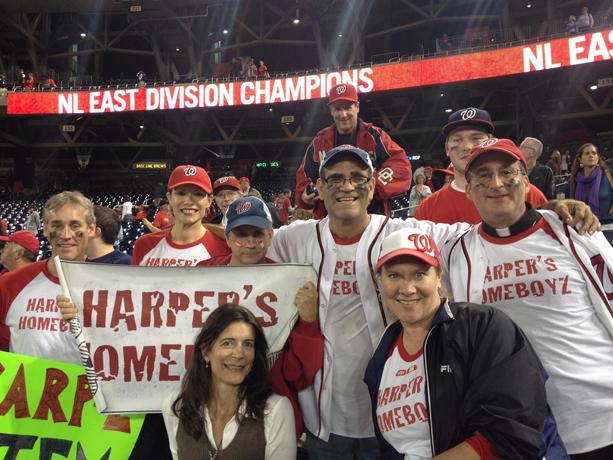Our Winning Nats Lose, But the Natitude Remains
By • October 24, 2012 0 1514

Before RGIII blots out the sports sun in Washington and maybe the world, let’s remember when baseball revealed itself to us, kissed us smack on the lips, and then like a feckless bride-to-be, left us standing at the altar, jilted for this time, the words “I do” already forming on our mouths, then stunned into silence.
Let us — before we succumb to our sporting lot in life, the yearly bout of Redskin mania, win-or-lose, and the startling charms of an astonishing rookie — one last time celebrate the coming of Natitude and appreciate the joys and sorrows of young Werth and the rest of the Nationals and the sunshine and sadness saga of the last five games of the astonishing 2012 season of baseball of the Washington Nationals.
The whole season exceeded all expectations by fans and the Nationals themselves, including the team’s first appearance in the post-season of any sort since the 1930s. The five-game series with the seasoned defending world champions St. Louis Cardinals further showed the dramatic rollercoaster ride baseball can provide for fans and players alike. As one baseball sage, oft-quoted, said, “It ain’t over ’til it’s over.” He failed to mention that when it is over—perhaps when the fat lady sings on some other stage—the effect is stunning, like an unforgiving punch in the mouth from someone you love.
The billions and billions of dollars and high television ratings that professional football generates does not negate the fact that it is NOT America’s game, but it has successfully marketed itself as such. Sure, we all remember where we were and what we were doing when the Redskins won their first Super Bowl—drunk and disorderly outside of Nathan’s at Wisconsin and M, watching people spinning from lamp posts, jumping up and down the roofs of parked cars.
Except for Bertram Abramson and perhaps two or three more, none of us remember when the Washington Senators won the World Series in 1924, because most who saw it are–to put it impolitely–dead. But we do and can go to the records of the day, the Baseball Encyclopedias, the stories by the much beloved Shirley Povich. Baseball has its own literature—part poetry, part hard numbers—that are unmatched by any sport, except perhaps some still missing epic fragment describing the events of an Olympiad in ancient Greece. Baseball brings out the romantic in us, as well as the statistician and mathematician. We’re forever writing fall classic poetry and figuring out new combinations of numbers that will tell us with runners on third and first has started the most double plays by a short stop, or who has dropped the most throws to first base in the second inning of any game.
I think that both tendencies point to what we really think of baseball, that among all team sports, it can contain the closest thing to mystery—even now with staggering player salaries which tend to remove them further from us, and the steroid scandals, which make hash of the very numbers we find mystifying. Baseball is about winning and losing, to be sure, like any team sport, but it’s also about how we live life, daily breathing, rising and sleeping interrupted by spurts of drama.
Here is the essential differences between watching the Nationals and watching the Redskins. The action in a football game are a series of miniature explosions in which 22 men on the field, disguised in warrior-like outfits of helmets, bulky pads, gloves, shoes, sometimes painted against the sun, sometimes bristling with tattoos, rise up in unison, rush at each other with unnatural speed and power. The quarterback yells, the defenders yell at each other, the linemen take the stance, the gibberish of the count is hollered out, the ball is snapped, runners move or not, receivers run down the field, and defenders run after them, the linemen collide and a play unfolds—run up the middle, pitch to the outside, throw down the field, screen pass, or, as happened Sunday, the quarterback runs 76 yard down field in a matter of seconds and wins the game.
Baseball is a game of silence and stillness at its core. Each half inning begins the same way—players trot out to the field, the pitcher takes the mound, the catcher—the only one with major protective gear—squats. The outfielders and infielders wait, while the pitcher decides how to throw to the batter. Essentially, nobody is doing anything until the pitch. What ensues is a kind of dance in which most of the dancers don’t dance but react.
Baseball is the opposite of football—not in its lack of violence—but in its definition of teamwork and what a team is. On the field, every individual is naked in spite of their uniforms, every act of symmetry, speed, throwing, hitting and throwing and pitching is glaringly scrutinized, especially in the time of the jumbo tron, the big screen, not just on the field but on television. That’s why it all becomes at some point theater, drama and resolution, both modest and sudden.
The Nationals won two games in the series: one when a rookie managed a two-run single after all the star bats had gone silent; the other when the $100-million plus star Jayson Werth worked St. Louis pitcher Lance Lynn for 12 pitches—seven of them foul balls that were all potential outs—and hit a 96-miles-per-hour fast ball perfectly on the last pitch, winning the game, tying the series, saving the day. “Walk off, play on,” read the Washington Post headline. Jubilation, unreasonable but worthy, ensued, accompanied by its unnatural outcome, hope unquestioned.
The day for which the game was saved came the next day, and it illustrates an entirely different aspect of baseball. It will break your heart, make you breathless and sadden and sour your days and nights for a year. If Jayson Werth felt the joys of victory, Drew Storen, one of the Nationals’ most effective relief pitchers, felt the uncommon, crushing, tantalizing despair of defeat, along with thousands of Nats fans. He was, to put in terms of how it was described, a strike away from victory, from the last out, from moving on to the National League championship series.
“Closed for the season,” cried the headline. Storen had given up four runs, three hits, allowing the Cardinals to come back from what was once a 6-0 deficit to a 9-7 victory. There is no explaining such a thing. It’s like coming home from a wedding to find your house has burned down. Only minutes before all this happened, one local broadcaster had eagerly and confidently said “and when we win tonight.” Baseball invites things like that and never lets you forget them.
These things do pass: we in Washington have found a baseball team to cheer for not because we must but because they’re good, better than good. The loss doesn’t mean they’re suddenly a mediocre team, but a heartbroken team which failed at a critical moment, an inch ago, days before in the series. It will still be the same team next year, and so, we follow the most enduring cry of baseball: “Wait ‘Til Next Year.”
That’s part of baseball, too. It hinges equally on the most amount of success and the least amount of failure, because a .333 batting average is a success, which means you succeed in only a third of your at bats. It also matters when you succeed. The Nationals’ last game was a matter of when. Brutally, it wasn’t then.
- Robert Devaney
- At Nationals Park, Harper’s Homeboyz: front, Lora Engdahl and Connie Poole; middle, Mark Marshall, Laura Boswell, Chris Bartos, Jorge Bernardo and Rev. Peter Nassetta and behind him, Pat Carroll.



